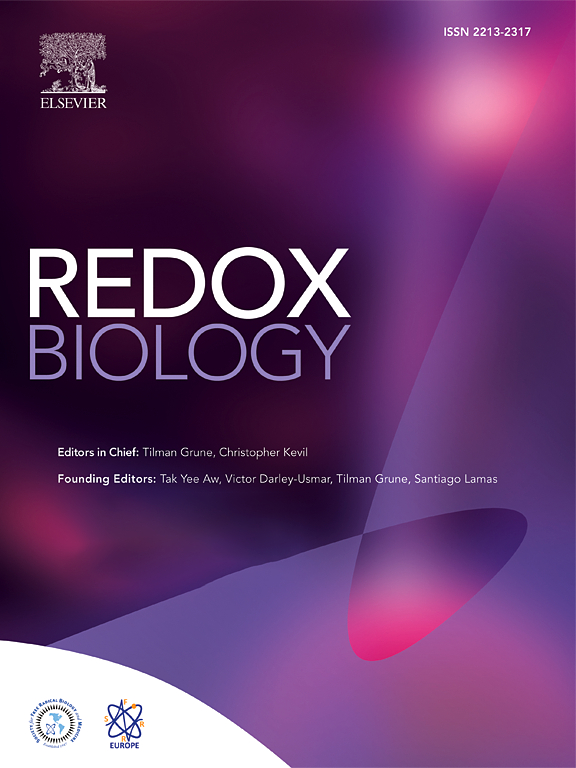Decreased gut microbiome-derived indole-3-propionic acid mediates the exacerbation of myocardial ischemia/reperfusion injury following depression via the brain-gut-heart axis
IF 10.7
1区 生物学
Q1 BIOCHEMISTRY & MOLECULAR BIOLOGY
引用次数: 0
Abstract
Despite the increasing recognition of the interplay between depression and cardiovascular disease (CVD), the precise mechanisms by which depression contributes to the pathogenesis of cardiovascular disease remain inadequately understood. The involvement of gut microbiota and their metabolites to health and disease susceptibility has been gaining increasing attention. In this study, it was found that depression exacerbated cardiac injury, impaired cardiac function (EF%: P < 0.01; FS%: P < 0.05), hindered long-term survival (P < 0.01), and intensified adverse cardiac remodeling (WGA: P < 0.01; MASSON: P < 0.0001) after myocardial ischemia/reperfusion (MI/R) in mice. Then we found that mice receiving microbiota transplants from chronic social defeat stress (CSDS) mice exhibited worse cardiac function (EF%: P < 0.01; FS%: P < 0.01) than those receiving microbiota transplants from non-CSDS mice after MI/R injury. Moreover, impaired tryptophan metabolism due to alterations in gut microbiota composition and structure was observed in the CSDS mice. Mechanistically, we analyzed the metabolomics of fecal and serum samples from CSDS mice and identified indole-3-propionic acid (IPA) as a protective agent for cardiomyocytes against ferroptosis after MI/R via NRF2/System xc-/GPX4 axis, played a role in mediating the detrimental influence of depression on MI/R. Our findings provide new insights into the role of the gut microbiota and IPA in depression and CVD, forming the basis of intervention strategies aimed at mitigating the deterioration of cardiac function following MI/R in patients experiencing depression.

肠道微生物源性吲哚-3-丙酸的减少通过脑-肠-心轴介导抑郁后心肌缺血/再灌注损伤的加重
尽管人们越来越认识到抑郁症和心血管疾病(CVD)之间的相互作用,但抑郁症导致心血管疾病发病的确切机制仍未得到充分的了解。肠道菌群及其代谢物对健康和疾病易感性的影响越来越受到关注。本研究发现,抑郁加重心脏损伤,心功能受损(EF%: P <;0.01;FS%: P <;0.05),长期生存受到阻碍(P <;0.01),不良心脏重构加剧(WGA: P <;0.01;梅森:P <;0.0001)心肌缺血/再灌注(MI/R)后。然后我们发现接受慢性社会失败应激(CSDS)小鼠微生物群移植的小鼠心脏功能更差(EF%: P <;0.01;FS%: P <;心肌梗死/R损伤后接受非csds小鼠微生物群移植的小鼠比接受非csds小鼠高0.01。此外,由于肠道菌群组成和结构的改变,在CSDS小鼠中观察到色氨酸代谢受损。在机制上,我们分析了CSDS小鼠粪便和血清样本的代谢组学,并通过NRF2/System xc-/GPX4轴鉴定吲哚-3-丙酸(IPA)是心肌细胞抗MI/R后铁凋亡的保护剂,在介导抑郁对MI/R的有害影响中起作用。我们的研究结果为肠道微生物群和IPA在抑郁症和CVD中的作用提供了新的见解,形成了旨在减轻抑郁症患者MI/R后心功能恶化的干预策略的基础。
本文章由计算机程序翻译,如有差异,请以英文原文为准。
求助全文
约1分钟内获得全文
求助全文
来源期刊

Redox Biology
BIOCHEMISTRY & MOLECULAR BIOLOGY-
CiteScore
19.90
自引率
3.50%
发文量
318
审稿时长
25 days
期刊介绍:
Redox Biology is the official journal of the Society for Redox Biology and Medicine and the Society for Free Radical Research-Europe. It is also affiliated with the International Society for Free Radical Research (SFRRI). This journal serves as a platform for publishing pioneering research, innovative methods, and comprehensive review articles in the field of redox biology, encompassing both health and disease.
Redox Biology welcomes various forms of contributions, including research articles (short or full communications), methods, mini-reviews, and commentaries. Through its diverse range of published content, Redox Biology aims to foster advancements and insights in the understanding of redox biology and its implications.
 求助内容:
求助内容: 应助结果提醒方式:
应助结果提醒方式:


